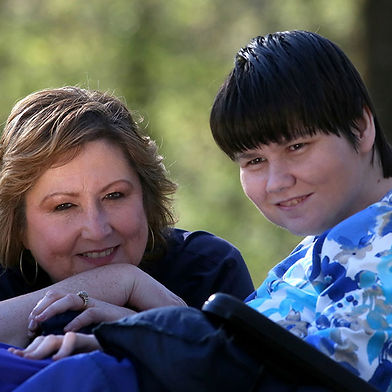Robin Watkins
When Robin Watkins finally moved her sister, MeLynda, from Virginia to Tennessee, she thought the hardest part was over. Robin and MeLynda had just lost their mother. For MeLynda, whose disabilities require round-the-clock care, that meant she’d also lost her full-time caregiver, and the only home she’d ever known. Thankfully, Robin and her husband David stepped in to help. Robin left her job with the Veterans Administration to care for MeLynda full-time in their home in Saulsbury, near Jackson.
Due to her cerebral palsy, MeLynda cannot move her legs. She uses a lift to move from her wheelchair to her bed or recliner, a process made more difficult by a childhood injury to her tailbone. She needs assistance eating and bathing, and has cognitive and intellectual disabilities that affect her memory and ability to communicate. Although she is 35, her mental development is closer to that of a five-year-old.
Robin was willing to alter her life and career to ensure that MeLynda had the care she needed. “We had to what was best for her,” Robin said. As soon as Robin and David unpacked MeLynda’s things, Robin began working to secure the benefits MeLynda would need in her new home.
Robin believed the best option for MeLynda was the Tennessee Self-Determination Waiver Program, which would allow Robin to be MeLynda’s paid caregiver. But communication failures between state agencies made applying for the program nearly impossible. The Department of Intellectual and Developmental Disabilities (DIDD) caseworker and the TennCare Bureau were telling Robin opposite things about how to proceed. Robin spent months filing applications and appeals, to no avail.
Meanwhile, MeLynda had no access to care. She could not get therapy and needed wheelchair modifications. Robin was paying out-of-pocket for doctor visits and medicine. Though Robin left her job to care for MeLynda, she wasn’t yet being paid for her time. It was a huge financial burden.“It was the most frustrating thing I’ve ever been through,” she said. “What’s so frustrating is the lack of knowledge and communication between the agencies.” Finally, Robin called the Tennessee Justice Center for help. TJC attorneys facilitated communication between TennCare and DIDD, and helped ensure MeLynda was enrolled in programs to meet her needs.
“TJC was there from the beginning,” Robin said. “It was like the burden had been lifted off my shoulders and there was someone who could help me carry it. Without their help, I truly believe that we would still be waiting for answers.” Now, MeLynda has settled into her new home. Robin is registered as her paid caregiver, which allows her to stay home with MeLynda full-time. She also receives other therapies and programs to help her thrive. She loves spending time with her family, especially traveling with Robin and David, visiting with David daughter’s Mandy, and doing crafts with her sister Elisabeth.
Despite all the changes for the family, Robin is happy to care for her sister, and she’s proud of what MeLynda has accomplished. “She does really good with the physical and mental challenges she faces daily and what she has been through,” Robin said.
For Robin’s relentless advocacy and passionate dedication to her sister, we are proud to honor her as a TJC Sister of the Year.
Published in 2016
